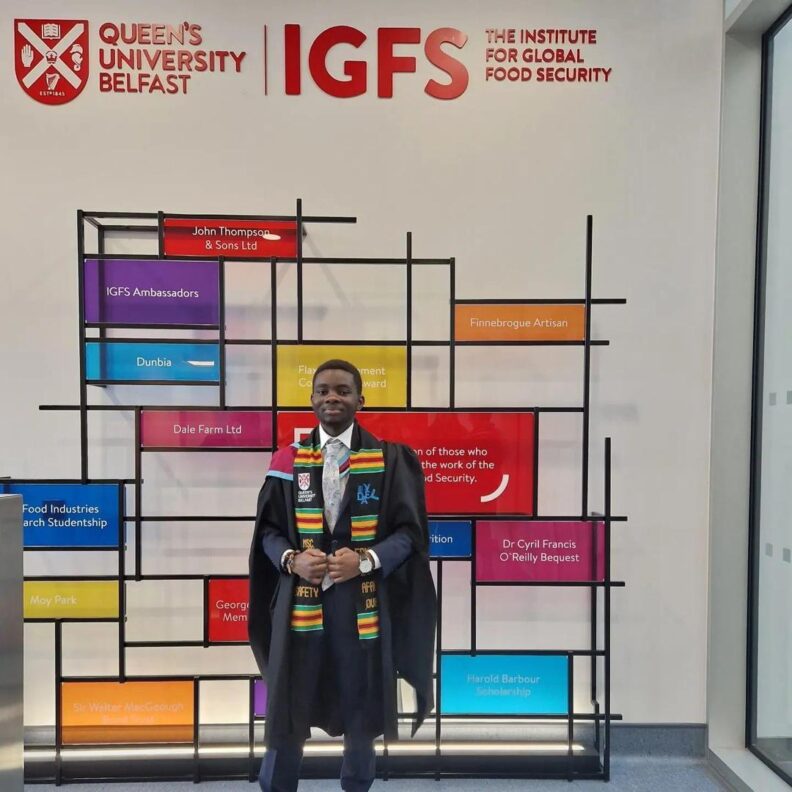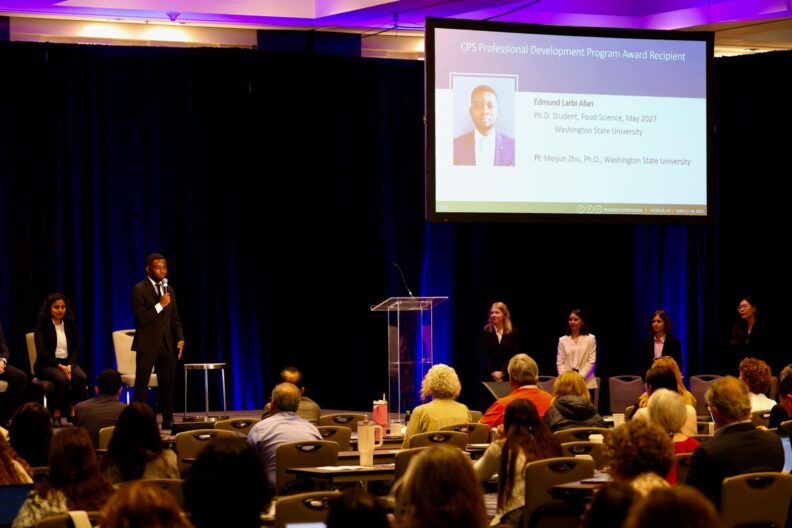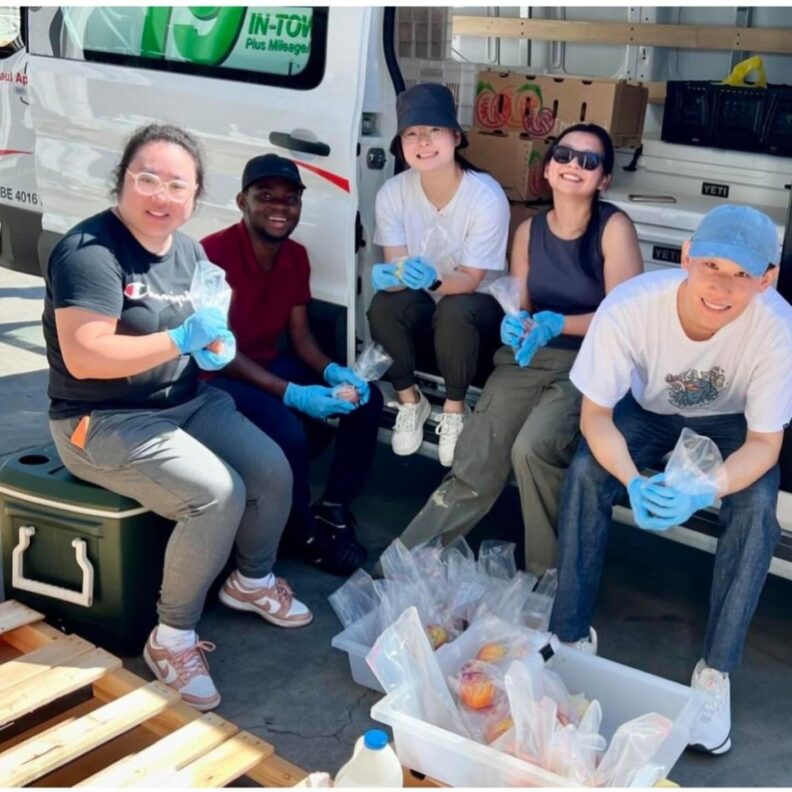PULLMAN, Wash. — Edmund Larbi Afari is a doctorate student whose research is in food safety, specifically microbial and chemical contamination of food.
Tell me a bit about your background – professional and/or personal?
I’m Edmund Larbi Afari and I’m originally from Ghana. I grew up in Adukrom-Akuapem, a small town in the Eastern Region of Ghana, and that’s where I had my basic education, then I moved to Koforidua for high school. For my Bachelor’s in Food Science and Technology, I attended the Kwame Nkrumah University of Science and Technology (KNUST).

In KNUST, I got exposed to a lot of leadership opportunities and the field of food science since I didn’t know about it before. When applying for college, you select four programs of interest, and food science was my last choice, which I got. I was hesitant at first, but I tried the first semester and realized it was fun
I then went to the UK for my masters in Advanced Food Safety at Queen’s University Belfast. Now, I’m here doing my PhD in Food Science at Washington State University.
What drew you towards specializing in food safety?
I actually got interested in food safety during my bachelor’s because of a professor I was working with, who focused mainly on food safety but specifically the chemical aspect. Looking at chemical contaminants from grilled chicken, goat, beef and all that, and it was very intriguing. I also read an article that spoke about food poisoning in Ghana, because we sell a lot of street foods and people were getting sick from it.
I have the view that food is nice, food is sweet. Nobody is supposed to fall sick from eating food, so that’s why I went into food safety, specifically trying to make sure that every food that we consume is safe.
Is there anything you wish more people knew about food safety?

I wish more people knew how serious food safety is. There is a lot of effort for awareness regarding it, but there is still room for improvement. I want people to know that food safety is just as important as how your food tastes. If you take an apple from the store and you don’t wash the apple before eating, the apple can make you sick. The problem with food borne pathogens or foodborne illnesses is sometimes you get sick and can recover within a short while, so some people don’t pay attention to it, however; there can also be long term effects too. Food can kill you, especially vulnerable and immunocompromised individuals, it’s very serious.
I feel like an added difficulty with foodborne illnesses is that it can be hard to tell how you got sick, too.
Yes, that’s the tricky part. Ironically, I got food poisoning the semester I was taking a food microbiology class. Looking back, I recall our fridge was down for a while and I had rice in it. So, I realized that it could have been Bacillus contamination going on in there, but not everybody has the opportunity to know that. With the sickness, you just feel a bit of discomfort, but after a few hours, it’s gone, so we don’t really pay attention to it that much.
What would you say is the most pressing food safety issue today or something you would like to see improved within the industry?
I think there have been a lot of recalls when it comes to leafy vegetables. The problem now with leafy greens, people don’t think about Salmonella or Listeria contamination. So, I think that is the issue that we are facing the most right now. Most people buy their lettuce and probably wouldn’t think that it is even important to wash it first. You probably put in a lot of effort in making sure your turkey is safe to eat, so why not your spinach?
What is your favorite accomplishment from during your time here at WSU?
I received the Center for Produce Safety’s Professional Development Award. The award is given to a few students across the US to recognize their work in the field of produce safety. I applied for it in May, and I didn’t think that I would get it, but then I did, which was really amazing. I’d say that’s one of the achievements I’m most proud of.

Do you have any advice for undergraduate students looking to pursue a graduate degree?
I think one thing that you should know is that you have to like what you are going to do. It requires a lot of effort, passion, and determination. Sometimes you might not like it, sometimes you might not feel motivated to move ahead, but you keep going because you like what you are doing. You don’t just go into a grad program because everyone else is doing it.
What are you hoping to do after you graduate?
I see myself in academia and doing more research and teaching. Ultimately, I want to be a professor so that is the goal. I think being a professor will give me the opportunity to mentor and coach people.
I also think part of going into industry instead, it’s more of the same every day, which isn’t a bad thing, but there is always something new happening in academia.

Yes, academia is not like that. You come back home thinking about your research, thinking about your lectures. It has its pros and cons, but I think academia will help you grow a lot. I can go into the industry and work in a food safety lab and do research there, but I want to be able to nurture young talents. That’s why I’m choosing academia over the industry after I graduate.
You’ve bounced around a lot, country-wise, is there anything interesting that you’ve noticed between the countries you’ve studied in, and their food safety practices?
I’ve realized across all these three countries or continents that a lot of people don’t know about food science, whether it’s in Ghana, the UK, or here. But if you think about it, every food on a grocery store shelf takes a food scientist for it to be there. Food safety wise, there are a lot of different perspectives. For instance, in Ghana, food safety there is more focused on foodborne illness, but in the UK, I realized that it was more focused on chemical safety. There’s the physical, chemical, and microbial safety, and I’d say for the UK, the focus is a lot more on chemical safety than microbial. In the US, there’s more focus on the microbial aspect, too. Each continent has different conditions and climates, so the approach to food safety is naturally going to be different too. I would say that Ghana has a lot in common with the US, but the UK is totally different.
Is there anything else you’d like to add?
I’m really passionate about leadership. I’m the senator for the School of Food Science, and part of that role is advocating for a lot of student issues. I also want to mention that sometimes we get boxed up in whatever that we do and we forget that we have to live, especially for grad students. Find something that you can focus on outside of your research that make you happy, and for me that’s leadership. Assuming you’re in school for seven years, that’s roughly about 10% of your life, right? So, make the most of it.